- Home
- Nathaniel Hawthorne
The Portable Hawthorne (Penguin Classics) Page 3
The Portable Hawthorne (Penguin Classics) Read online
Page 3
The human Heart to be allegorized as a cavern; at the entrance there is sunshine, and flowers growing about it. You step within, but a short distance, and begin to find yourself surrounded with a terrible gloom, and monsters of divers kinds; it seems like Hell itself. You are bewildered, and wander long without hope. At last a light strikes upon you. You press towards it yon, and find yourself in a region that seems, in some sort, to reproduce the flowers and sunny beauty of the entrance, but all perfect. These are the depths of the heart, or of human nature, bright and peaceful; the gloom and terror may lie deep; but deeper still is this eternal beauty.
FROM THE AMERICAN NOTEBOOKS
MY KINSMAN, MAJOR MOLINEUX 1832
After the kings of Great Britain had assumed the right of appointing the colonial governors, the measures of the latter seldom met with the ready and general approbation, which had been paid to those of their predecessors, under the original charters. The people looked with most jealous scrutiny to the exercise of power, which did not emanate from themselves, and they usually rewarded the rulers with slender gratitude, for the compliances, by which, in softening their instructions from beyond the sea, they had incurred the reprehension of those who gave them. The annals of Massachusetts Bay will inform us, that of six governors, in the space of about forty years from the surrender of the old charter, under James II., two were imprisoned by a popular insurrection; a third, as Hutchinson inclines to believe, was driven from the province by the whizzing of a musket ball; a fourth, in the opinion of the same historian, was hastened to his grave by continual bickerings with the House of Representatives; and the remaining two, as well as their successors, till the Revolution, were favored with few and brief intervals of peaceful sway. The inferior members of the court party, in times of high political excitement, led scarcely a more desirable life. These remarks may serve as preface to the following adventures, which chanced upon a summer night, not far from a hundred years ago. The reader, in order to avoid a long and dry detail of colonial affairs, is requested to dispense with an account of the train of circumstances, that had caused much temporary inflammation of the popular mind.
It was near nine o’clock of a moonlight evening, when a boat crossed the ferry with a single passenger, who had obtained his conveyance, at that unusual hour, by the promise of an extra fare. While he stood on the landing-place, searching in either pocket for the means of fulfilling his agreement, the ferryman lifted a lantern, by the aid of which, and the newly risen moon, he took a very accurate survey of the stranger’s figure. He was a youth of barely eighteen years, evidently country-bred, and now, as it should seem, upon his first visit to town. He was clad in a coarse grey coat, well worn, but in excellent repair; his under garments were durably constructed of leather, and sat tight to a pair of serviceable and well-shaped limbs; his stockings of blue yarn, were the incontrovertible handiwork of a mother or a sister; and on his head was a three-cornered hat, which in its better days had perhaps sheltered the graver brow of the lad’s father. Under his left arm was a heavy cudgel, formed of an oak sapling, and retaining a part of the hardened root; and his equipment was completed by a wallet, not so abundantly stocked as to incommode the vigorous shoulders on which it hung. Brown, curly hair, well-shaped features, and bright, cheerful eyes, were nature’s gifts, and worth all that art could have done for his adornment.
The youth, one of whose names was Robin, finally drew from his pocket the half of a little province-bill of five shillings, which, in the depreciation of that sort of currency, did but satisfy the ferryman’s demand, with the surplus of a sexangular piece of parchment valued at three pence. He then walked forward into the town, with as light a step, as if his day’s journey had not already exceeded thirty miles, and with as eager an eye, as if he were entering London city, instead of the little metropolis of a New England colony. Before Robin had proceeded far, however, it occurred to him, that he knew not whither to direct his steps; so he paused, and looked up and down the narrow street, scrutinizing the small and mean wooden buildings, that were scattered on either side.
“This low hovel cannot be my kinsman’s dwelling,” thought he, “nor yonder old house, where the moonlight enters at the broken casement; and truly I see none hereabouts that might be worthy of him. It would have been wise to inquire my way of the ferryman, and doubtless he would have gone with me, and earned a shilling from the Major for his pains. But the next man I meet will do as well.”
He resumed his walk, and was glad to perceive that the street now became wider, and the houses more respectable in their appearance. He soon discerned a figure moving on moderately in advance, and hastened his steps to overtake it. As Robin drew nigh, he saw that the passenger was a man in years, with a full periwig of grey hair, a wide-skirted coat of dark cloth, and silk stockings rolled about his knees. He carried a long and polished cane, which he struck down perpendicularly before him, at every step; and at regular intervals he uttered two successive hems, of a peculiarly solemn and sepulchral intonation. Having made these observations, Robin laid hold of the skirt of the old man’s coat, just when the light from the open door and windows of a barber’s shop, fell upon both their figures.
“Good evening to you, honored Sir,” said he, making a low bow, and still retaining his hold of the skirt. “I pray you to tell me whereabouts is the dwelling of my kinsman, Major Molineux?”
The youth’s question was uttered very loudly; and one of the barbers, whose razor was descending on a well-soaped chin, and another who was dressing a Ramillies wig, left their occupations, and came to the door. The citizen, in the meantime, turned a long favored countenance upon Robin, and answered him in a tone of excessive anger and annoyance. His two sepulchral hems, however, broke into the very centre of his rebuke, with most singular effect, like a thought of the cold grave obtruding among wrathful passions.
“Let go my garment, fellow! I tell you, I know not the man you speak of. What! I have authority, I have—hem, hem—authority; and if this be the respect you show your betters, your feet shall be brought acquainted with the stocks, by daylight, tomorrow morning!”
Robin released the old man’s skirt, and hastened away, pursued by an ill-mannered roar of laughter from the barber’s shop. He was at first considerably surprised by the result of his question, but, being a shrewd youth, soon thought himself able to account for the mystery.
“This is some country representative,” was his conclusion, “who has never seen the inside of my kinsman’s door, and lacks the breeding to answer a stranger civilly. The man is old, or verily—I might be tempted to turn back and smite him on the nose.” Ah, Robin, Robin! even the barber’s boys laugh at you, for choosing such a guide! You will be wiser in time, friend Robin.
He now became entangled in a succession of crooked and narrow streets, which crossed each other, and meandered at no great distance from the water-side. The smell of tar was obvious to his nostrils, the masts of vessels pierced the moonlight above the tops of the buildings, and the numerous signs, which Robin paused to read, informed him that he was near the centre of business. But the streets were empty, the shops were closed, and lights were visible only in the second stories of a few dwelling-houses. At length, on the corner of a narrow lane, through which he was passing, he beheld the broad countenance of a British hero swinging before the door of an inn, whence proceeded the voices of many guests. The casement of one of the lower windows was thrown back, and a very thin curtain permitted Robin to distinguish a party at supper, round a well-furnished table. The fragrance of the good cheer steamed forth into the outer air, and the youth could not fail to recollect, that the last remnant of his travelling stock of provision had yielded to his morning appetite, and that noon had found, and left him, dinnerless.
“Oh, that a parchment three-penny might give me a right to sit down at yonder table,” said Robin, with a sigh. “But the Major will make me welcome to the best of his victuals; so I will even step boldly in, and inquire my way to his dwelling.”
He entered the tavern, and was guided by the murmur of voices, and fumes of tobacco, to the public room. It was a long and low apartment, with oaken walls, grown dark in the continual smoke, and a floor, which was thickly sanded, but of no immaculate purity. A number of persons, the larger part of whom appeared to be mariners, or in some way connected with the sea, occupied the wooden benches, or leather-bottomed chairs, conversing on various matters, and occasionally lending their attention to some topic of general interest. Three or four little groups were draining as many bowls of punch, which the great West India trade had long since made a familiar drink in the colony. Others, who had the aspect of men who lived by regular and laborious handicraft, preferred the insulated bliss of an unshared potation, and became more taciturn under its influence. Nearly all, in short, evinced a predilection for the Good Creature in some of its various shapes, for this is a vice, to which, as the Fast-day sermons of a hundred years ago will testify, we have a long hereditary claim. The only guests to whom Robin’s sympathies inclined him, were two or three sheepish countrymen, who were using the inn somewhat after the fashion of a Turkish Caravansary; they had gotten themselves into the darkest corner of the room, and, heedless of the Nicotian atmosphere, were supping on the bread of their own ovens, and the bacon cured in their own chimney-smoke. But though Robin felt a sort of brotherhood with these strangers, his eyes were attracted from them, to a person who stood near the door, holding whispered conversation with a group of ill-dressed associates. His features were separately striking almost to grotesqueness, and the whole face left a deep impression in the memory. The forehead bulged out into a double prominence, with a vale between; the nose came boldly forth in an irregular curve, and its bridge was of more than a finger’s breadth; the eyebrows were deep and shaggy, and the eyes glowed beneath them like fire in a cave.
While Robin deliberated of whom to inquire respecting his kinsman’s dwelling, he was accosted by the innkeeper, a little man in a stained white apron, who had come to pay his professional welcome to the stranger. Being in the second generation from a French Protestant, he seemed to have inherited the courtesy of his parent nation; but no variety of circumstance was ever known to change his voice from the one shrill note in which he now addressed Robin.
“From the country, I presume, Sir?” said he, with a profound bow. “Beg to congratulate you on your arrival, and trust you intend a long stay with us. Fine town here, Sir, beautiful buildings, and much that may interest a stranger. May I hope for the honor of your commands in respect to supper?”
“The man sees a family likeness! the rogue has guessed that I am related to the Major!” thought Robin, who had hitherto experienced little superfluous civility.
All eyes were now turned on the country lad, standing at the door, in his worn three-cornered hat, grey coat, leather breeches, and blue yarn stockings, leaning on an oaken cudgel, and bearing a wallet on his back.
Robin replied to the courteous innkeeper, with such an assumption of consequence, as befitted the Major’s relative.
“My honest friend,” he said, “I shall make it a point to patronize your house on some occasion, when”—here he could not help lowering his voice—“I may have more than a parchment three-pence in my pocket. My present business,” continued he, speaking with lofty confidence, “is merely to inquire the way to the dwelling of my kinsman, Major Molineux.”
There was a sudden and general movement in the room, which Robin interpreted as expressing the eagerness of each individual to become his guide. But the innkeeper turned his eyes to a written paper on the wall, which he read, or seemed to read, with occasional recurrences to the young man’s figure.
“What have we here?” said he, breaking his speech into little dry fragments. “ ‘Left the house of the subscriber, bounden servant, Hezekiah Mudge—had on, when he went away, grey coat, leather breeches, master’s third best hat. One pound currency reward to whoever shall lodge him in any jail in the province.’ Better trudge, boy, better trudge!”
Robin had begun to draw his hand towards the lighter end of the oak cudgel, but a strange hostility in every countenance, induced him to relinquish his purpose of breaking the courteous innkeeper’s head. As he turned to leave the room, he encountered a sneering glance from the bold-featured personage whom he had before noticed; and no sooner was he beyond the door, than he heard a general laugh, in which the innkeeper’s voice might be distinguished, like the dropping of small stones into a kettle.
“Now is it not strange,” thought Robin, with his usual shrewdness, “is it not strange, that the confession of an empty pocket, should outweigh the name of my kinsman, Major Molineux? Oh, if I had one of these grinning rascals in the woods, where I and my oak sapling grew up together, I would teach him that my arm is heavy, though my purse be light!”
On turning the corner of the narrow lane, Robin found himself in a spacious street, with an unbroken line of lofty houses on each side, and a steepled building at the upper end, whence the ringing of a bell announced the hour of nine. The light of the moon, and the lamps from numerous shop windows, discovered people promenading on the pavement, and amongst them, Robin hoped to recognize his hitherto inscrutable relative. The result of his former inquiries made him unwilling to hazard another, in a scene of such publicity, and he determined to walk slowly and silently up the street, thrusting his face close to that of every elderly gentleman, in search of the Major’s lineaments. In his progress, Robin encountered many gay and gallant figures. Embroidered garments, of showy colors, enormous periwigs, gold-laced hats, and silver hilted swords, glided past him and dazzled his optics. Travelled youths, imitators of the European fine gentlemen of the period, trod jauntily along, half-dancing to the fashionable tunes which they hummed, and making poor Robin ashamed of his quiet and natural gait. At length, after many pauses to examine the gorgeous display of goods in the shop windows, and after suffering some rebukes for the impertinence of his scrutiny into people’s faces, the Major’s kinsman found himself near the steepled building, still unsuccessful in his search. As yet, however, he had seen only one side of the thronged street; so Robin crossed, and continued the same sort of inquisition down the opposite pavement, with stronger hopes than the philosopher seeking an honest man, but with no better fortune. He had arrived about midway towards the lower end, from which his course began, when he overheard the approach of some one, who struck down a cane on the flag-stones at every step, uttering, at regular intervals, two sepulchral hems.
“Mercy on us!” quoth Robin, recognizing the sound.
Turning a corner, which chanced to be close at his right hand, he hastened to pursue his researches, in some other part of the town. His patience was now wearing low, and he seemed to feel more fatigue from his rambles since he crossed the ferry, than from his journey of several days on the other side. Hunger also pleaded loudly within him, and Robin began to balance the propriety of demanding, violently and with lifted cudgel, the necessary guidance from the first solitary passenger, whom he should meet. While a resolution to this effect was gaining strength, he entered a street of mean appearance, on either side of which, a row of ill-built houses was straggling towards the harbor. The moonlight fell upon no passenger along the whole extent, but in the third domicile which Robin passed, there was a half-opened door, and his keen glance detected a woman’s garment within.
“My luck may be better here,” said he to himself.
Accordingly, he approached the door, and beheld it shut closer as he did so; yet an open space remained, sufficing for the fair occupant to observe the stranger, without a corresponding display on her part. All that Robin could discern was a strip of scarlet petticoat, and the occasional sparkle of an eye, as if the moonbeams were trembling on some bright thing.
“Pretty mistress,”—for I may call her so with a good conscience, thought the shrewd youth, since I know nothing to the contrary—“my sweet pretty mistress, will you be kind enough to tell me whereabouts I must seek the d
welling of my kinsman, Major Molineux?”
Robin’s voice was plaintive and winning, and the female, seeing nothing to be shunned in the handsome country youth, thrust open the door, and came forth into the moonlight. She was a dainty little figure, with a white neck, round arms, and a slender waist, at the extremity of which her scarlet petticoat jutted out over a hoop, as if she were standing in a balloon. Moreover, her face was oval and pretty, her hair dark beneath the little cap, and her bright eyes possessed a sly freedom, which triumphed over those of Robin.
“Major Molineux dwells here,” said this fair woman.
Now her voice was the sweetest Robin had heard that night, the airy counterpart of a stream of melted silver; yet he could not help doubting whether that sweet voice spoke Gospel truth. He looked up and down the mean street, and then surveyed the house before which they stood. It was a small, dark edifice of two stories, the second of which projected over the lower floor; and the front apartment had the aspect of a shop for petty commodities.
“Now truly I am in luck,” replied Robin, cunningly, “and so indeed is my kinsman, the Major, in having so pretty a housekeeper. But I prithee trouble him to step to the door; I will deliver him a message from his friends in the country, and then go back to my lodgings at the inn.”
“Nay, the Major has been a-bed this hour or more,” said the lady of the scarlet petticoat; “and it would be to little purpose to disturb him to-night, seeing his evening draught was of the strongest. But he is a kind-hearted man, and it would be as much as my life’s worth, to let a kinsman of his turn away from the door. You are the good old gentleman’s very picture, and I could swear that was his rainy-weather hat. Also, he has garments very much resembling those leather—But come in, I pray, for I bid you hearty welcome in his name.”
So saying, the fair and hospitable dame took our hero by the hand; and though the touch was light, and the force was gentleness, and though Robin read in her eyes what he did not hear in her words, yet the slender waisted woman, in the scarlet petticoat, proved stronger than the athletic country youth. She had drawn his half-willing footsteps nearly to the threshold, when the opening of a door in the neighborhood, startled the Major’s housekeeper, and, leaving the Major’s kinsman, she vanished speedily into her own domicile. A heavy yawn preceded the appearance of a man, who, like the Moonshine of Pyramus and Thisbe, carried a lantern, needlessly aiding his sister luminary in the heavens. As he walked sleepily up the street, he turned his broad, dull face on Robin, and displayed a long staff, spiked at the end.

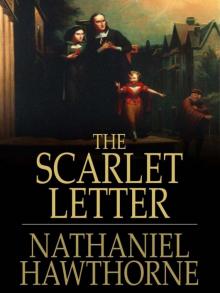 The Scarlet Letter
The Scarlet Letter Young Goodman Brown : By Nathaniel Hawthorne - Illustrated
Young Goodman Brown : By Nathaniel Hawthorne - Illustrated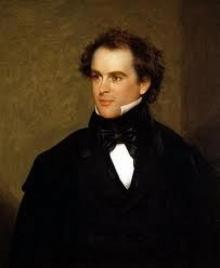 The Birthmark
The Birthmark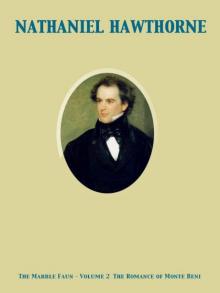 The Marble Faun; Or, The Romance of Monte Beni - Volume 1
The Marble Faun; Or, The Romance of Monte Beni - Volume 1 The Minister's Black Veil
The Minister's Black Veil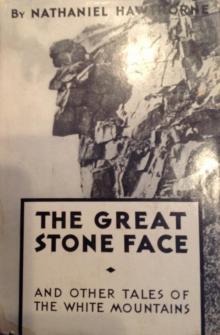 The Great Stone Face, and Other Tales of the White Mountains
The Great Stone Face, and Other Tales of the White Mountains The House of the Seven Gables
The House of the Seven Gables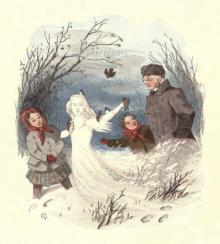 The Snow Image
The Snow Image The Blithedale Romance
The Blithedale Romance Rappaccini's Daughter: By Nathaniel Hawthorne - Illustrated
Rappaccini's Daughter: By Nathaniel Hawthorne - Illustrated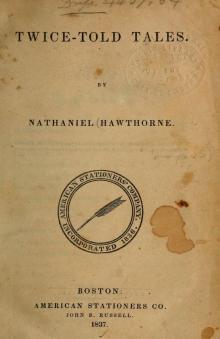 Twice-Told Tales
Twice-Told Tales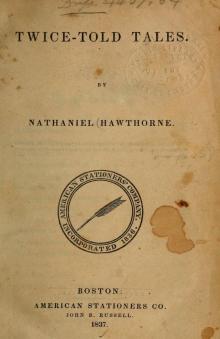 Twice Told Tales
Twice Told Tales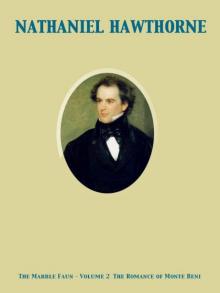 The Marble Faun; Or, The Romance of Monte Beni - Volume 2
The Marble Faun; Or, The Romance of Monte Beni - Volume 2_preview.jpg) Footprints on the Sea-Shore (From Twice Told Tales)
Footprints on the Sea-Shore (From Twice Told Tales)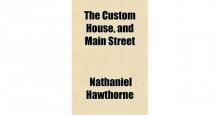 Main Street
Main Street_preview.jpg) The Seven Vagabonds (From Twice Told Tales)
The Seven Vagabonds (From Twice Told Tales) Fanshawe
Fanshawe Chippings with a Chisel
Chippings with a Chisel Selected Tales and Sketches
Selected Tales and Sketches Young Goodman Brown
Young Goodman Brown Roger Malvin's Burial
Roger Malvin's Burial The Prophetic Pictures
The Prophetic Pictures The Village Uncle
The Village Uncle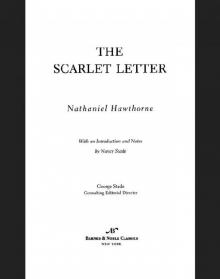 Scarlet Letter (Barnes & Noble Classics Series)
Scarlet Letter (Barnes & Noble Classics Series) The Procession of Life
The Procession of Life Drowne's Wooden Image
Drowne's Wooden Image Hawthorne's Short Stories
Hawthorne's Short Stories My Kinsman, Major Molineux
My Kinsman, Major Molineux Legends of the Province House
Legends of the Province House Foot-Prints on the Sea-Shore
Foot-Prints on the Sea-Shore The Haunted Quack
The Haunted Quack Tanglewood Tales
Tanglewood Tales The Seven Vagabonds
The Seven Vagabonds Mosses from an Old Manse, Volume 2
Mosses from an Old Manse, Volume 2 The Canterbury Pilgrims
The Canterbury Pilgrims Wakefield
Wakefield The Gray Champion
The Gray Champion The White Old Maid
The White Old Maid The Snow-Image: A Childish Miracle
The Snow-Image: A Childish Miracle The Gentle Boy
The Gentle Boy Mr. Higginbotham's Catastrophe
Mr. Higginbotham's Catastrophe![The Threefold Destiny: A Fairy Legend, by Ashley Allen Royce [pseud.] Read online](http://i1.bookreadfree.com/i2/04/10/the_threefold_destiny_a_fairy_legend_by_ashley_allen_royce_pseud__preview.jpg) The Threefold Destiny: A Fairy Legend, by Ashley Allen Royce [pseud.]
The Threefold Destiny: A Fairy Legend, by Ashley Allen Royce [pseud.] Lady Eleanore`s Mantle
Lady Eleanore`s Mantle The Great Carbuncle
The Great Carbuncle The Portable Hawthorne (Penguin Classics)
The Portable Hawthorne (Penguin Classics) True Stories from History and Biography
True Stories from History and Biography